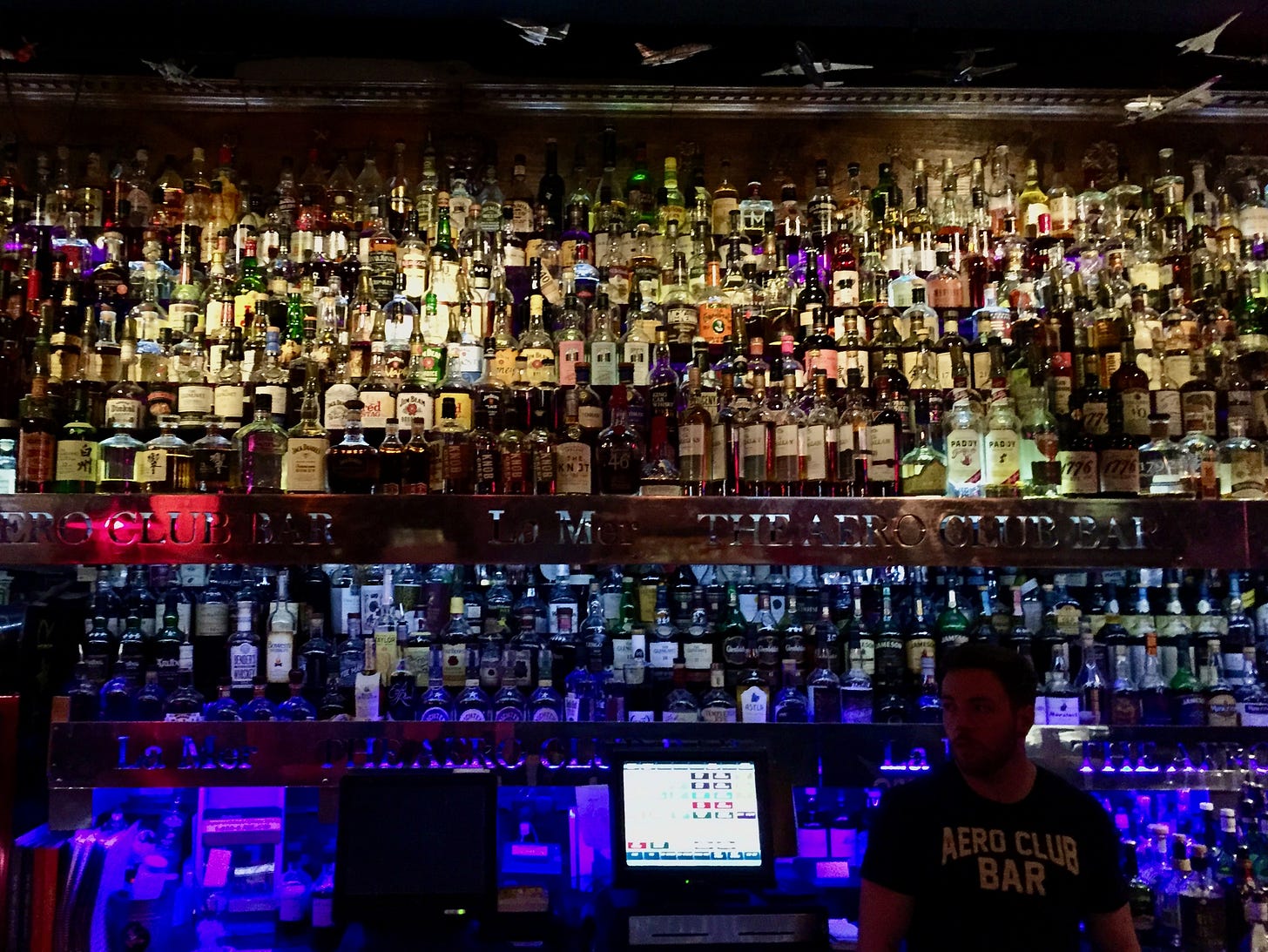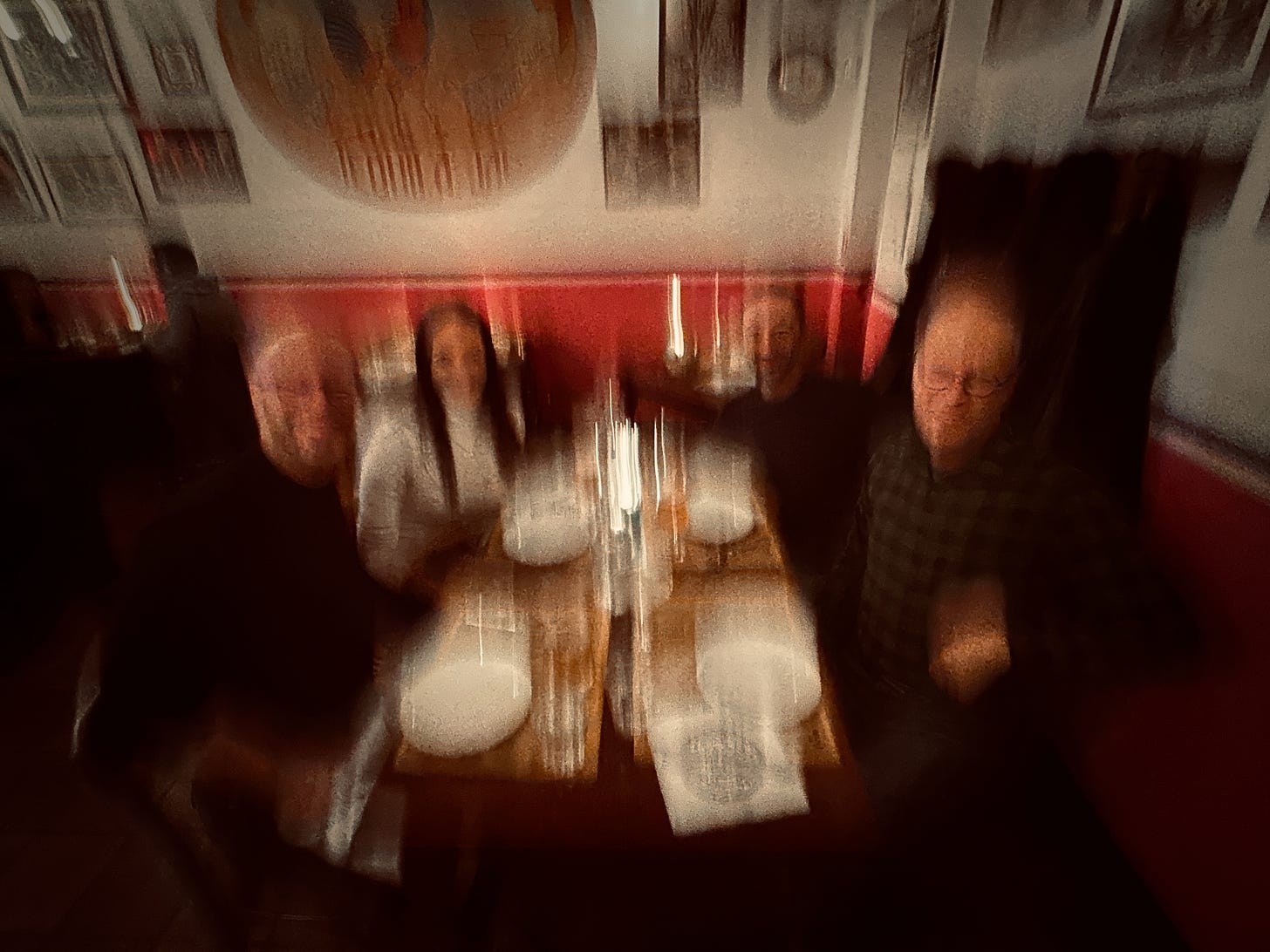52 Drinks
A 365-day experiment in drinking less
On January 1st of last year, I realized I wanted to drink less. As I thought about what that might look like, I decided that I’d like to have, on average, one drink per week throughout the year. So I decided to call the experiment “52 Drinks.” That seemed like a sensible goal, and the title had a catchy ring to it.
I told my husband about the idea, and he decided to join the challenge. So I created a shared Apple Note for us on my iPhone, and we each committed to keeping a numbered list of all alcoholic drinks we consumed in 2024.
What Prompted This?
I’d been thinking about my alcohol consumption off and on for some years. My husband and I had even participated in Dry January for a number of years. (I recall it going more or less fine, though usually by the third week, I’d wryly note that I wished I had signed up for “Dry first-two-weeks-of January.”)
There were quite a few motivating factors for me to undertake the 52 Drinks experiment, and they ranged from relatively trivial to far more consequential.
Beginning with the least serious:
I wanted to consume fewer empty calories, because I’d been meaning to lose five or 10 pounds for about, oh, 20 years or so.
I was never quite sure how to answer when my doctor would ask at my annual physical exam how much alcohol I consume. I’d typically answered “Two or three drinks a week.”
Starting sometime in my 40s, alcohol—especially beer—frequently triggered my sinuses.
Also starting sometime in my 40s, alcohol began to affect my sleep in ways it never had previously.
The older I get, the more I dislike the feeling of being impaired, or not fully in control—especially now that I live in a foreign country where my language skills are still very basic. Because what if there was an emergency.
I kept learning more about how alcohol contributes to anxiety and depression.1 (As I wrote in my book, I’ve had struggles with serious and debilitating depression. While thankfully the worst of that appears to be behind me, I am still a person regularly prone to down days.)
And finally, a triple whammy:
I have alcoholism in my family.
I have an addictive personality.
I have a history of alcohol abuse.
I never really had many of what I considered to be the signs of a “problem drinker.” For example, I never drank at home, and I never drank alone. But in my mid-20s I began hanging out in a circle of people who had not grown up fundamentalist and didn’t share my religious hangups. When we would go out partying or clubbing on the weekends, I would often get pretty ripped. That time in my life felt in many ways like a delayed adolescence, and it also happened to coincide with some of my difficult earlier days of coming to terms with being gay. When I was drinking, I felt fun, free, fearless, uninhibited, liberated.
I have quite a few drinking stories from my 20s and 30s that I used to somehow spin as “hilarious,” but which I now find horrifying. The day after one party where I’d been particularly inebriated, as I was going on about what a “great time” I’d had, a close friend cut me off mid-sentence and said sharply, “It’s not funny. It’s scary.”2
I did a lot of things while drinking that were stupid, obnoxious, even dangerous. I’ve been haunted by and deeply ashamed of some of these memories for decades. I’m incredibly fortunate that I never inadvertently harmed myself or others while intoxicated.
Looking back decades later, it all seems embarrassingly cliché. It’s obvious that I was immature; that I was rebelling against my rigid, rules-based upbringing; and that I was using alcohol to numb my self-hatred and medicate my pain.
Somewhere over the last 15 years or so, I got my (what I now recognize to be) binge drinking more or less under control.3 I think part of it is just that I matured. Part of it is that it’s become much more normalized in Western society to not drink;4 this is perhaps due to more and more research showing the downsides of alcohol and the negative mental and physical effects it can have. (See “Resources” below.) And part of it, certainly, is the love of my husband, and the stability and growth he has brought to my life in the nearly 20 years since we first met.
How the Year Went
Overall, I found 52 Drinks to be pretty manageable. There were times it felt quite easy, there were other times it felt like a big annoyance. I did realize fairly early in the year that I was on track to exceed 52, but I decided that I would keep going, regardless.
At the end of 2024, I’d had 100 drinks.5 This means, of course, that I’d had nearly twice as many drinks as I’d set out to. In light of that, I suppose it would be easy to consider 52 Drinks a failed experiment, but I actually consider it to be a very worthwhile endeavor.
For starters, I was surprised by how beneficial it felt to really pay attention to how much I was/was not drinking. And even if I failed to meet my self-imposed target, I definitely drank less in 2024 than I did in 2023.6
The experiment caused my husband and I to explore a variety of “mocktails” and non-alcoholic beers, many of which we enjoyed and found quite impressive.7 I really enjoy the experience of “having a drink,” and I realized a drink doesn’t have to have alcohol in it for me to get much of the same satisfaction from doing so.
The challenge also helped me to pay more attention to how I feel, both physically and emotionally. I noticed that when I had a drink or two, I felt good for a while, but once the buzz wore off, I virtually always felt worse. In fact, I became particularly fascinated by the realization that the longer I went without drinking, the better I felt. Usually after one-and-a-half to two weeks without a drink, I would suddenly realize that I felt cleaner and clearer without alcohol. This happened at least a dozen times during the year, and each time it caught me by surprise.
The challenge also made me realize how much time gets wasted or spoiled because of drinking. One Friday, after having gone several weeks without a drink, we got together with some good friends. The four of us shared a nice bottle of wine over a lovely dinner, and finished the night off with a few sips of digestivi.
The next day, I awoke to a gorgeous sunny Saturday—and I felt yucky. I wasn’t even hung over; I just didn’t want to do anything. I didn’t want to get out and enjoy the beautiful weather by taking the dog for a walk, or going for a hike or a bike ride. I just wanted to lay on the couch and mope. And I was really bummed about that, because I knew it was totally unnecessary.
(Writing this story reminds me of something I heard actor Tom Holland say in an interview recently, when he quoted a friend who told him, “You’ll never wake up in the morning and say to yourself, ‘I wish I’d had a drink last night.’”)
There were a fair number of times during the year where I realized that not only did I not want to drink, but in fact I wanted to not drink. But there were also times when I did drink even though I hadn’t planned to, or would even have preferred not to. For example, over the holiday break we invited some new friends over for lunch, and when they arrived they’d (kindly) brought us a nice big bottle of sparkling wine. We opened it and I ended up having two glasses, which then made me feel drowsy and blah for the rest of the afternoon. It made me aware that there is often subtle, indirect, well-intentioned, or entirely unintended social pressure to drink.8 In fact, looking back over my list for the year, I would say there were at least a half a dozen such occasions. I could, of course, have said no. But I either didn’t want to offend someone by not drinking—I realize how lame this sounds even as I type it—or I found it easier to give in to the temptation to drink than to embrace the inconvenience of abstaining.
Andrew and I are doing 52 Drinks again this year, and by year’s end I’m hoping to land closer to 52 than to 100!
What about you?
I wrote this piece to try to start a conversation with those who are interested in reducing or eliminating their alcohol consumption in 2025. Given the perilous state of the world right now, I’d imagine some of you think you couldn’t possibly dial back drinking, as it feels like one of the only things that’s helping you cope. I hear you, and I can totally understand why you might say that. But I will tell you that I think you will feel better if you drink less. Even if it might seem counterintuitive, drinking is often a short-term gain but a long-term loss.
“You’ll never wake up in the morning and say to yourself, ‘I wish I’d had a drink last night.’”
I’m sure this piece raised questions for many of you, and perhaps some objections as well. (Please share them in the comments!) But if you’re interested in drinking less, there are many fantastic, science-based resources available. Below are some of the ones that have influenced my thinking in this area.
RESOURCES
The New York Times - ‘Sober Curious’? How to Embrace Mindful Drinking
The Washington Post - How Cutting Back on Alcohol Can Help Depression and Anxiety
The New York Times - Why Does Alcohol Mess With My Sleep?
The New York Times - How Red Wine Lost Its Health Halo
The Rich Roll Podcast - Andy Ramage on Creating the 'One Year No Beer' Movement and How Alcohol-Freedom Unlocked His Potential (2019)
The Rich Roll Podcast - Andy Ramage on the Benefits of An Alcohol-Free Lifestyle (2024)
The Rich Roll Podcast - The Limitless Power of An Alcohol-Free Lifestyle With 'One Year No Beer' Co-founder Ruari Fairbairns (2024)
The Rich Roll Podcast - Tom Holland is More Than Spider-Man: On living alcohol-free, acting with authenticity, and launching a second career (2024) [The sobriety discussion starts at approximately the 1:03 mark]
The Huberman Lab Podcast9 - What Alcohol Does to Your Body, Brain & Health
One Year No Beer - A supportive resource to help you discover your best self—beyond alcohol
Dryy app - An alcohol-free community full of passionate, positive people looking to transform their lives by taking a break from alcohol
If You Need Professional Help
If you are an alcoholic, or if you suspect you may have an alcohol abuse problem, I strongly encourage you to 1) Talk with your doctor, and, if necessary, 2) Seek out a meeting of Alcoholics Anonymous. You are almost certainly aware of AA, the world’s largest and most well-known program dedicated to abstinence-based recovery from alcoholism through its famed 12-step program. I know several people who credit AA with literally saving their lives, as in “I would certainly be dead if I had not gotten and stayed sober through AA." If you need help, please reach out for it today.
And caffeine—but that’s a story for another day.
I was, predictably, annoyed. And probably a little offended. Because sometimes the truth hurts. Thank you for caring enough about me to say something, M.M. ❤️
I don’t mean to imply that I never occasionally over-indulge anymore, but inadvisedly having one or two too many glasses of wine over dinner with friends is quite a bit different than what I did in my 20s and 30s.
Even in Germany, a country known worldwide for the excesses of Oktoberfest.
My husband had only 50 drinks, so he not only came in at half my number, he even beat our shared goal.
This makes me think that my previously mentioned “2-3 drinks a week” estimate to my doctor each year almost certainly underestimated the real count by 1-2 drinks per week.
We’ve also sampled a number of non-alcoholic wines, though we’ve generally found that NA wines are not nearly as satisfying or authentic tasting as NA beers.
This is, of course, not unique to Italy. In fact I would say there is less social “pressure” to drink here than in my home country of the United States.
Yes, I know; it’s Andrew Huberman. But in this case, I’m choosing to separate the message from the problematic messenger.





I spent several years wanting to drink less only to end up drinking more. Looking back, my biggest clue that I had a problem was how much time and energy I spent analyzing, justifying, negotiating with drinking. I quit completely 4 years ago at age 55. My only regret is that I didn’t quit sooner.
Love this idea! I think I’m already doing it unintentionally. My partying, binge-drinking days have been long gone. I’m turning 40 this fall and have been noticing lately how shitty alcohol makes me feel (mainly the next day), even if it’s just 2 beers! It’s not worth it. I’d much rather have a clear mind than the foggy post-alcohol brain. BUT I also love the occasional little buzz. In particular (which seems so counterintuitive), I love sipping a cold beer after sports. It’s something I picked up since living in the Netherlands. Being active and sporty is big here, but socializing over a few beers right after is the norm. I do that most Sundays when I play padel with friends. I might try keeping a record for the rest of 2025!